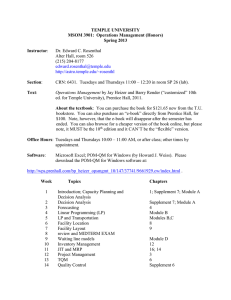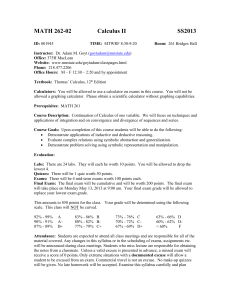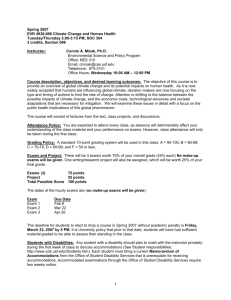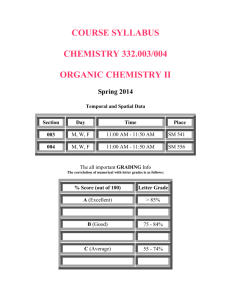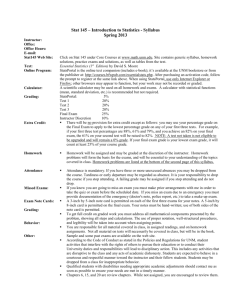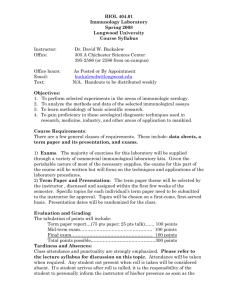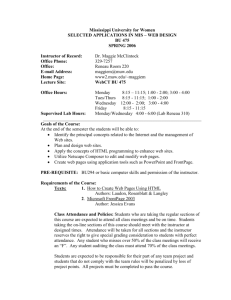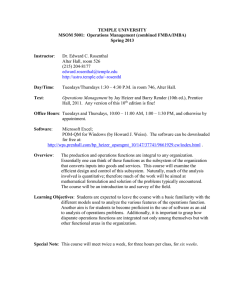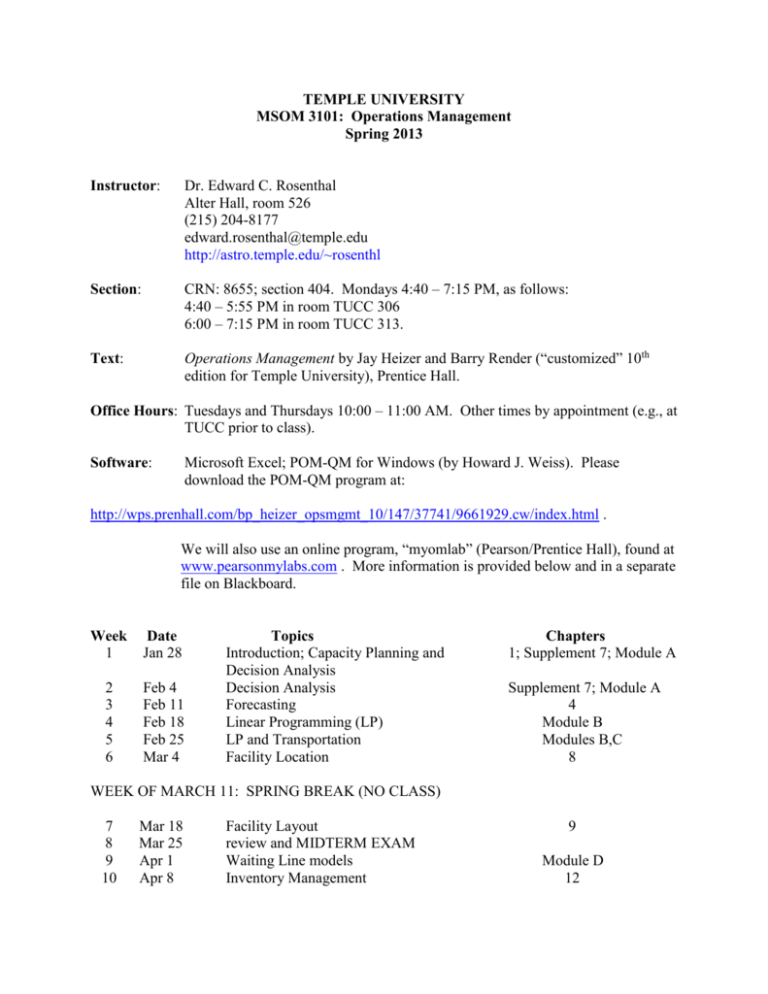
TEMPLE UNIVERSITY
MSOM 3101: Operations Management
Spring 2013
Instructor:
Dr. Edward C. Rosenthal
Alter Hall, room 526
(215) 204-8177
edward.rosenthal@temple.edu
http://astro.temple.edu/~rosenthl
Section:
CRN: 8655; section 404. Mondays 4:40 – 7:15 PM, as follows:
4:40 – 5:55 PM in room TUCC 306
6:00 – 7:15 PM in room TUCC 313.
Text:
Operations Management by Jay Heizer and Barry Render (“customized” 10th
edition for Temple University), Prentice Hall.
Office Hours: Tuesdays and Thursdays 10:00 – 11:00 AM. Other times by appointment (e.g., at
TUCC prior to class).
Software:
Microsoft Excel; POM-QM for Windows (by Howard J. Weiss). Please
download the POM-QM program at:
http://wps.prenhall.com/bp_heizer_opsmgmt_10/147/37741/9661929.cw/index.html .
We will also use an online program, “myomlab” (Pearson/Prentice Hall), found at
www.pearsonmylabs.com . More information is provided below and in a separate
file on Blackboard.
Week
1
Date
Jan 28
2
3
4
5
6
Feb 4
Feb 11
Feb 18
Feb 25
Mar 4
Topics
Introduction; Capacity Planning and
Decision Analysis
Decision Analysis
Forecasting
Linear Programming (LP)
LP and Transportation
Facility Location
Chapters
1; Supplement 7; Module A
Supplement 7; Module A
4
Module B
Modules B,C
8
WEEK OF MARCH 11: SPRING BREAK (NO CLASS)
7
8
9
10
Mar 18
Mar 25
Apr 1
Apr 8
Facility Layout
review and MIDTERM EXAM
Waiting Line models
Inventory Management
9
Module D
12
11
12
13
14
Apr 15
Apr 22
Apr 29
May 6
JIT and MRP
Project Management
TQM
Quality Control
16; 14
3
6
Supplement 6
FINAL EXAM: MONDAY MAY 13
Prerequisites:
STAT 2103 (old numbering 2101 and 2102) or equivalents.
Notes: (1.) Bring a USB drive to the lab sessions so that you can save files!
(2.) The class notes are available on our class’s Blackboard (Bb) site under “Course
Documents.” Please download this file (154 pp. in Word) and either download it
to your laptop or print it out as soon as possible.
(3.) We will be using the Blackboard site for the class for weekly communication and
posting of files.
About the textbook: you will need to purchase the “customized” edition in the
TU bookstore. It sells for $121.65. When you purchase this book, it will come
packaged with an access code to allow you to register for myomlab. We will use
myomlab for homework (worth 10% of grade).
Overview:
The production and operations functions are integral to any organization.
Essentially one can think of these functions as the subsystem of the organization
that converts inputs into goods and services. This course will examine the
efficient design and control of this subsystem. Naturally, much of the analysis
involved is quantitative; therefore much of the work will be aimed at
mathematical formulation and solution of the problems typically encountered.
The course will be an introduction to and survey of the field.
Objectives:
Students are expected to leave the course with a basic familiarity with the
different models used to analyze the various features of the operations function.
Another aim is for students to become proficient in the use of software as an aid
to analysis of operations problems. Additionally, it is important to grasp how
disparate operations functions are integrated not only among themselves but with
other functional areas in the organization.
Grading:
Homework with myomlab (10% of course grade).
Quiz 1 (10% of course grade)
Quiz 2 (10% of course grade)
Midterm exam (30% of course grade).
Final exam (40%). The final exam will be comprehensive.
Exams:
Exams and quizzes will be given in the computer lab. The computer will be
available as a tool for you to carry out necessary analysis. The quizzes and exams
will be open book as well (i.e., free access to your textbook, notes, files, etc.)
However, you are not allowed to use the Internet (for Bb, e-mail, etc.) or a cell
phone during exams.
Homework: All assigned HW will be online using myomlab. Some of the HW problems
appear exactly as they do in the textbook and others will involve slight variations
from those in the book. HW assignments will be regularly given (with due dates)
and you will be carrying out your work within the myomlab program. The
program will provide grades for your efforts and these grades will count 10%
toward your overall class grade. I will be going over the HW after each
assignment.
Miscellaneous:
No additional work will be required or accepted.
There will be no make-up exams, excepting extraordinary circumstances.
Eating and drinking are prohibited in the lab. Finally, a reminder: all
coursework is supposed to be individual work. In particular, copying,
soliciting or receiving help from others on homework or exams, and abetting
such activity are prohibited and can result in failure for the exam in question or
for the course.
Finally: The following is taken from Temple University’s policies on student and faculty rights:
Disability Statement: This course is open to all students who meet the academic
requirements for participation. Any student who has a need for accommodation based on the
impact of a disability should contact the instructor privately to discuss the specific situation as
soon as possible. Contact Disability Resources and Services at 215-204-1280 in 100 Ritter
Annex to coordinate reasonable accommodations for students with documented disabilities.
Statement on Academic Freedom: Freedom to teach and freedom to learn are inseparable
facets of academic freedom. The University has adopted a policy on Student and Faculty
Academic Rights and Responsibilities (Policy # 03.70.02) which can be accessed through the
following link: http://policies.temple.edu/getdoc.asp?policy_no=03.70.02.

